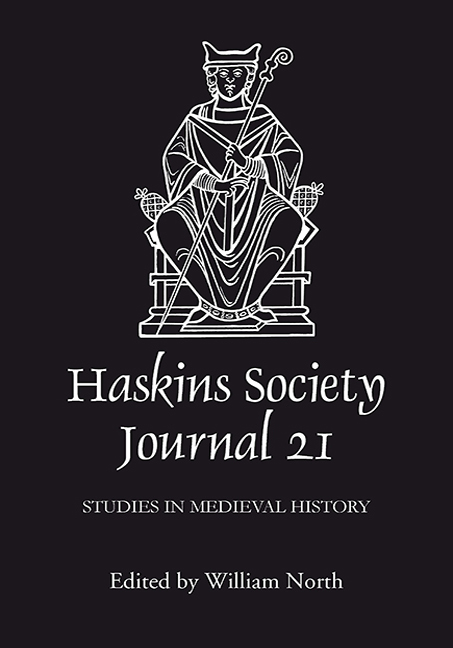Book contents
- Frontmatter
- Contents
- Editor's Note
- Abbreviations
- 1 Bede and the Rewriting of Sanctity
- 2 The Role of Rivers and Coastlines in Shaping Early English History
- 3 Containing Virginity: Sex and Society in Early Medieval England
- 4 Pagans and Infidels, Saracens and Sicilians: Identifying Muslims in the Eleventh-Century Chronicles of Norman Italy
- 5 Robert Curthose and the Norman Episcopate
- 6 The Revival of Roman Law: the Exceptiones Petri
- 7 Mutatis Mutandis: Literary Borrowing from Jerome's Letter to Eustochium and Others in the Life of Blessed Bernard of Tiron by Geoffrey Grossus
- 8 Acting Out Friendship: Signs and Gestures of Aristocratic Male Friendship in the Twelfth Century
- 9 The Quantification of Assarted Land in Mid- and Late Twelfth-Century England
- 10 Origins of Courtliness after 25 Years
4 - Pagans and Infidels, Saracens and Sicilians: Identifying Muslims in the Eleventh-Century Chronicles of Norman Italy
Published online by Cambridge University Press: 28 April 2017
- Frontmatter
- Contents
- Editor's Note
- Abbreviations
- 1 Bede and the Rewriting of Sanctity
- 2 The Role of Rivers and Coastlines in Shaping Early English History
- 3 Containing Virginity: Sex and Society in Early Medieval England
- 4 Pagans and Infidels, Saracens and Sicilians: Identifying Muslims in the Eleventh-Century Chronicles of Norman Italy
- 5 Robert Curthose and the Norman Episcopate
- 6 The Revival of Roman Law: the Exceptiones Petri
- 7 Mutatis Mutandis: Literary Borrowing from Jerome's Letter to Eustochium and Others in the Life of Blessed Bernard of Tiron by Geoffrey Grossus
- 8 Acting Out Friendship: Signs and Gestures of Aristocratic Male Friendship in the Twelfth Century
- 9 The Quantification of Assarted Land in Mid- and Late Twelfth-Century England
- 10 Origins of Courtliness after 25 Years
Summary
In 1061, the Christian and Muslim inhabitants of Reggio in Calabria armed themselves to support Robert Guiscard in his campaign against the Muslims of Sicily. Although perhaps surprising to modern eyes, such collaboration between Christians and Muslims was a common experience in Robert's world. He used knights, presumably Muslim, from the conquered towns of Portinico and Corleone against other Muslims. In addition, as he established control of Sicily, he saw fit to put a Muslim in charge of a town that had fallen under his influence. Indeed, in his early career Robert himself had served as a mercenary in the service of a Muslim lord in Sicily. In short, the political actions and military campaigns of the Hauteville family in Southern Italy, particularly Robert and his brother Roger, do not break down easily along religious lines. For this reason, the major chronicle accounts of their actions offer a valuable opportunity to examine how the ethnic groups of Southern Italy and Sicily were presented in the context of the Normans’ deeds. Such an examination is particularly important because much of what we know about their interactions with the Muslims of Sicily comes from these few early histories of the conquest.
Three chronicles have been used extensively in constructing the history of the Norman conquest of Sicily and Southern Italy in the late eleventh century: the Ystoire de li Normant et la Chronique de Robert Viscart of Amatus of Montecassino, the Gesta Roberti Wiscardi of William of Apulia, and the De Rebus Gestis Rogerii Calabriae et Siciliae Comitis et Roberti Guiscardi Ducis Fratris Eius of Geoffrey Malaterra. Devoted to the conquests and deeds of Robert Guiscard, his brother Roger de Hauteville, Richard of Capua, and others, these chronicles culminated in the transfer of power from various Greek, Lombard, and Muslim rulers to the more consolidated lordship of the Normans. Yet, while these works have been mined for historical information, and scholars have investigated their reliability, the literary tropes used by their authors, and other topics, their historiographical presentation of Muslims and what that tells us about Christian perceptions of Muslims in Sicily and Southern Italy in this period has not received the sustained attention it deserves.
- Type
- Chapter
- Information
- The Haskins Society Journal 212009. Studies in Medieval History, pp. 67 - 86Publisher: Boydell & BrewerPrint publication year: 2010



